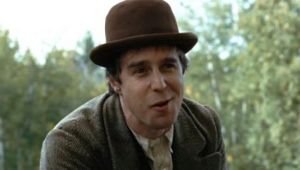On a flight recently, I watched Unstoppable, with Denzel Washington trying to halt a driverless locomotive on the loose. For a run-of-the-mill disaster movie, it wasn’t half bad. It put me strongly in mind though of the far superior Runaway Train, which isn’t a disaster movie and is far from run of the mill. What it is, in fact, is one of the few truly great movies from a decade, the 1980s, more renowned for its interest in box-office receipts than gutsy, bravura film-making.
Runaway Train marks both a stepping-stone and a milestone in the career of its star, Jon Voight. As a young actor in the 1970s, Voight could do no wrong, and did none to devastating effect in Midnight Cowboy, Deliverance, The Odessa File and The Champ, culminating in his Oscar-winning role as a crippled Vietnam returnee in Coming Home.
Later, in the 1990s, he reinvented himself as a supporting character actor to great success in such films as Heat, Mission: Impossible, The Rainmaker, Enemy of the State, Tomb Raider, Ali and my personal favourite, Anaconda. So you’d be forgiven for thinking he spent the 1980s sitting around on his arse squandering his wealth and talent.
In fact, he made three films, and 1985’s Runaway Train is arguably his best, not just of the '80s, but of all his films, before or since. Voight’s performance as the scarfaced beast of a jailbird Oscar ‘Manny’ Mannheim burns off the screen so convincingly, you wouldn’t recognise it was him if you hadn’t seen his name at the top of the credits.
You’d be forgiven for thinking he spent the 1980s sitting around on his arse squandering his wealth and talent.
Manny is so dangerous, even in the confines of his remote Alaskan prison, that for the last three years he’s been welded into his cell. We first see him when Warden Ranken is reluctantly forced to let him out. When threatened with a court appeal that could keep him sealed up for longer, Manny responds, ‘I could last nine more months . . . I could stand on my head nine months.’
The early jail scenes were scripted by real-life prison author Eddie Bunker, who also appears as an inmate – as does an almost unrecognisably young-looking Danny Trejo. A boxing match between Trejo and Eric Roberts as Buck, Manny’s fellow escapee-to-be, sums up the atmosphere: a prisoner in the audience sports a T-shirt that says EAT SHIT and the scene ends in brutal knife-wielding violence while the Warden looks on dispassionately. Manny is as impervious to physical assault as Chopper Read. ‘I’m at war with the world and everybody in it,’ he says at one point, connecting his personality with the ‘No beast so fierce’ quote from Richard III that provides the film’s epigraph. Manny is a beast, and the film’s existential M.O. is to test the depths of his savagery.
This brings out some great lines. During their escape, he says to his nauseous, gagging accomplice, ‘What’s the matter, you never been in a sewer before?’ From this, we realise that his whole life has been one big sewer, the stench of which has lost its power to bother him anymore. When the ill-fated train of the title rolls out of a cloud of steam – like the first time that we see Travis Bickle’s cab in Taxi Driver – Manny says, ‘Hey, look. There’s my limousine to Broadway, right there.’ And when Buck asks ‘Why that one?’ he replies, ‘Cos I want it.’ It’s a poignant moment: we know that this will be the last bad decision in a life of bad decisions, taken because he mistakes random events for a misplaced notion of destiny. It’s moments like these that carry the film forward to Manny’s eventual conclusion on the human condition – ‘Win, lose, what’s the difference?’ – and the sense of tragedy captured in its final haunting images.
As the other two corners in the psychodrama on board the hurtling, out-of-control train, Eric Roberts as the dim young tearaway Buck and Rebecca de Mornay as a railway worker also trapped on board are given possibly the most interesting roles of both their careers. Buck serves to bring out Manny’s mentoring instinct, which offers a glimpse of redeeming humanity, but which also deepens our perception of his tragic flaw when he admits that he can only ever wish to live the straight-and-narrow life he advises Buck to follow, something that has always been beyond his ability. Manny’s realism is contrasted by the girl Sara’s readiness to put faith in ‘miracles’ and her rejection of his school-of-hard-knocks approach. ‘You’re an animal,’ she spits at him later when he’s kicking the shit out of Buck for being weak. ‘No, worse,’ he replies. ‘Human. Human!’ The poignancy of Manny’s predicament is only heightened further when even she finally urges Buck to ‘kill him, kill him!’
Manny is a beast, and the film’s existential M.O. is to test the depths of his savagery.
But the real supporting honours in this tremendous movie go to John P. Ryan as Ranken, the vengeful and obsessed prison Warden who comes after Manny and entwines himself in his fate. Despite his superior position and authority, Ranken is as savage as Manny and utterly without promise of any saving grace. Ryan’s manic grin will be familiar to viewers of a certain age from TV parts in the likes of Kojak, The Rockford Files and Hawaii Five-O. Here he gives the performance of his career and gets almost as many great lines as Voight, one of the best being after he’s terrorised a railway official for not showing proper compliance: ‘Wipe that piss off your face. I don’t wanna hear anymore crap outta you.’
The leanings towards Shakespearean tragedy come as little surprise when you learn that Runaway Train was based on a screenplay by Akira Kurosawa, the giant of Japanese cinema who filmed interpretations of King Lear and Macbeth; while the hopelessness of technology against nature and man against wilderness is brilliantly created through a backdrop of flying snow clouds and towering glaciers and some amazing stunt work in the hands of Russian émigré director Andrei Konchalovsky.
But it’s Voight’s performance that guides and characterises the film’s grand digression from the norms of ’80s Hollywood. ‘You’ll never stop this train, ever,’ he rants up at the sky near the end as he struggles his way through superhuman acts of pity, suffering and victory. ‘You hear me? I won. I won.’
Click here for more stories about TV & Film
Click here to follow Sabotage Times on Twitter
Click here to follow Sabotage Times on Facebook



